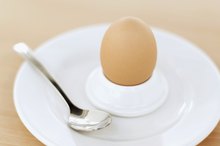What Does the Brain Need to Function Nutritionally?
Like the rest of your body, your brain depends on food to run at peak performance. That's why you may feel sharp as a tack after a healthy lunch and mentally sluggish on a junk-food diet. For peak mental function, include a wide variety of foods in your diet, as no one nutrient can provide everything your brain needs.
Carbo Fuel
Your body converts carbohydrates from food into glucose, your brain's primary energy source. That's why healthy carbohydrate sources such as whole-wheat bread, oatmeal, brown rice and air-popped popcorn will help ensure top mental performance. When you don't get enough carbs, your body must produce substances called ketones to fuel your brain. Excess ketones, however, can cause side effects such as nausea, bad breath and even kidney failure. For your brain and body's sake, get 45 percent to 65 percent of your calories from carbohydrates each day.
Essential Protein
Important Energy Sources for the Brain
Learn More
Your brain needs protein to build neurotransmitters, messenger chemicals that allow brain cells to communicate. When you eat protein, your body breaks it down into individual amino acids such as tryptophan, tyrosin and phenylalanine, which affect cognition and mood in different ways. For example, tyrosine spurs your brain to produce the neurotransmitters norepinephrine and dopamine, which help you stay alert. To reap the rewards of protein, get 10 percent to 35 percent of your daily calories from this nutrient. Healthy sources include beans, seafood, egg whites and reduced-fat cheese.
Friendly Fat
As with protein, your body breaks down dietary fats and sends some of the building blocks -- fatty acids -- to your brain. Omega-3 and Omega-6 fatty acids, in particular, are important for healthy brain function, according to the University of Maryland Medical Center. Fatty-acid balance matters, and the university notes that a Mediterranean-style diet, which emphasizes fish, olive oil, produce and whole grains, provides a healthier fatty-acid distribution than the typical Western diet, which is heavy in meat and dairy. Aim to get 20 percent to 35 percent of total calories from healthy fat sources.
Vitamins and Minerals
Lifestyle Tips For A Healthy Limbic System
Learn More
Your brain also needs an assortment of vitamins and minerals to thrive, including B vitamins, vitamin E, calcium, iron and magnesium. Evidence, however, shows that taking supplements will not help cognitive function, according to Dr. Gary Wenk. To get your fill of essential nutrients, eat a varied diet that includes fresh, unprocessed foods in a rainbow of colors such as white, red, yellow, green and blue.
Related Articles
References
Writer Bio
Nina K. is a Los Angeles-based journalist who has been published by USAToday.com, Fitday.com, Healthy Living Magazine, Organic Authority and numerous other print and web publications. She has a philosophy degree from the University of Colorado and a journalism certificate from UCLA.









